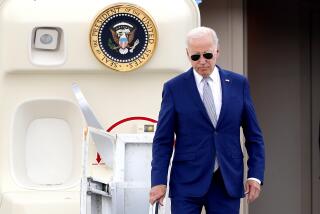Vow, Vetting of Speech Got Clinton Air Time
- Share via
HO CHI MINH CITY, Vietnam — Through months of negotiations that led to President Clinton’s state visit, U.S. Ambassador Douglas “Pete” Peterson kept assuring Communist authorities that if they agreed to carry Clinton’s speech to university students on a live national TV broadcast, “there will be no surprises.”
But the authorities were nervous. They expected Clinton to be confrontational on the issues of human rights and religious freedom. And if the speech were carried live--a concession never before granted any visiting head of state--the Communist Party would lose, however briefly, the one tool it clings to most fiercely: control of information.
In the end, sources from both countries said, the concession was made on one condition: The United States would deliver the speech for examination by Vietnamese officials three hours before its planned delivery. If there were “surprises,” or if the tone was controversial, authorities would pull the plug on the live broadcast for “technical” reasons.
The broadcast went ahead as scheduled. For the speech, and for other, nontelevised ones during Clinton’s three-day visit that ended Sunday, the president was given high marks by foreign diplomats for straddling a fine line: He forcefully conveyed his message on the need for human rights, religious freedom and open political and economic systems, but he refrained from lecturing. He dwelt not on communism’s shortcomings but on the strengths of democracy and the Vietnamese culture.
“Let me say emphatically,” he told 400 students at Vietnam National University in Hanoi, “we do not seek to impose these ideals, nor could we. Vietnam is an ancient and enduring country. Only you can decide how to weave individual liberties and human rights into the rich and strong fabric of Vietnamese national identity.”
An estimated 20 million Vietnamese, or one of every four residents, watched Clinton’s speech, according to a quasi-governmental poll. His remarks appeared to be well received, particularly when he spoke of the two countries’ “intertwined” history, which dates back 200 years, to when President Thomas Jefferson tried to import Vietnamese rice seeds to plant on his Virginia farm. Still, a Vietnamese official admitted, “the leadership was not relaxed.”
According to Vietnamese officials familiar with Clinton’s trip, the ruling Politburo was uneasy with the notion that the visit could be a catalyst for political change. Its members did not want a free exchange of ideas that might get people wondering if communism really was the best route for national development and individual fulfillment.
The university students at Clinton’s speech were instructed to be respectful but unemotional and to clap only at the beginning and end, some students said later. The U.S. delegation asked that a 30-minute question-and-answer session be allowed after the speech and that an additional 1,000 students be permitted to assemble in the university courtyard to hear the speech over loudspeakers. Both requests were denied, and the courtyard was empty.
The Communist Party was so unsettled by the idea that its views might be overshadowed by Clinton’s words that Monday’s edition of the Viet Nam News, an English-language daily, reported what party chief Le Kha Phieu had told Clinton during their weekend meeting but nothing of what Clinton had said in Vietnam. Throughout the trip, the Vietnamese media made no mention of the enthusiastic crowds that greeted Clinton at each stop.
With 300 foreign journalists in Vietnam to cover the visit, the country had a golden opportunity to showcase its progress and extol the virtues of its system. But Hanoi never issued a press release, other than giving Clinton’s schedule, or held a briefing. The only briefing it did schedule, by the Foreign Ministry, was canceled at the last minute because, as one official explained: “No one was willing to give it. Everyone was scared. There was risk in saying the wrong thing and no reward in saying the right thing.”
Meanwhile, Washington brought in 30 government public information specialists and bombarded the White House press corps with briefings, some given by officials who knew a great deal about the U.S. perspective on politics and economics but little about Vietnam. The result was coverage that often reflected the U.S. spin, focusing more on Vietnam’s failures than its accomplishments.
But clearly both sides--and Vietnam frequently used the words “our side” and “your side” during negotiations--had reason to consider Clinton’s visit a major success. As one Vietnamese official put it: “We are closer today than we were yesterday. Bill Clinton played by the rules. He showed an understanding of our culture and respected our dignity. That has not always been the case with American presidents.”
More to Read
Get the L.A. Times Politics newsletter
Deeply reported insights into legislation, politics and policy from Sacramento, Washington and beyond. In your inbox twice per week.
You may occasionally receive promotional content from the Los Angeles Times.








